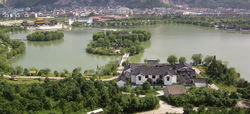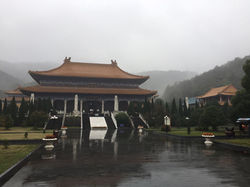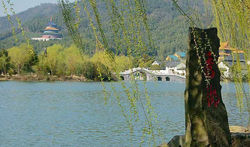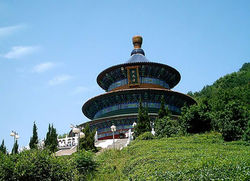Woodenfish 2017 Humanistic Buddhist
Monastic Life Program (HBMLP)
What's it like? Watch Scenes from previous HBMLP's!
Program Duration
Dates: July 1st to July 28th, 2017
2018 Applications Will be available in January
We will consider applications on a rolling basis. Please submit your application as soon as possible to increase your chance of acceptance. If you have particular questions, please fully read the detailed information below and refer to our Frequently Asked Questions.
Program Locale
The program will take place in Xinyin Temple, located in Yuyao, 40km from the city of Ningbo (a 2-hour train ride from Shanghai), Zhejiang province, southeast of China. As part of the "Jade center of the world”, which is a famous tourist area, this temple is an ideal location for HBMLP. The grounds of the temple are filled with traditional Chinese painting landscape elements such as pavilions, pagodas, a lake, and island. The most distinguishing feature of the grounds is the ample use of jade as a building material-- all of the Buddha statues are made of real jade, and the largest Sakyamuni Buddha statue is 3 meters high and weighs more than 30 tons. Xinying Temple covers Phoenix mountain, 5.73 hectares, and it is also the largest temple with Ming-Qing Dynasty style in the world. All participants will be provided lodging on the temple grounds.
Cultural Tour Location: Mout Putuo 普陀山. Mount Putuo is one of the four sacred Buddhist mountains in China, home of Guanyin Bodhisattva, the Bodhisattva of Compassion. Mount Putuo is an island outside of the city of Ningbo, which is southeast of Shanghai. Mount Putuo has been a famous pilgrimage site for over one thousand years and is home to more than 30 significant Buddhist temples.
 |  |  |  |
|---|---|---|---|
 |  |  | |
 |  |  |
Photos of Xinyin Temple, site of HBMLP 2017
Program Overview and Objectives
The objective of the program is to promote the understanding of Chinese Buddhism by exposing participants to the daily life, practice and theory of Buddhism within a traditional Buddhist monastic setting.
The Woodenfish HBMLP provides international graduate and undergraduate students interested in the study of religion, Buddhism and Chinese culture with a first-hand experience with the lifestyle, training, and rituals of contemporary Chinese Buddhist monastics. Moreover, it includes academic lectures and discussions in order to provide the participants with historical and doctrinal background for understanding the Chinese Buddhist experience.
The primary goals of the program include:
-
Offering participants a chance to personally experience Buddhism as it is practiced in modern day China.
-
Provide courses on Buddhism and Chinese culture taught by Buddhist monastics and lay scholars.
-
Introducing participants to the concepts and practices of Humanistic Buddhism.
-
Experiencing and reflecting on Buddhist monastic discipline and traditions.
-
Exposing participants to Chinese culture and language.
-
Cultivation of the mind through meditation.
Program Content
Key elements
-
Training in monastic customs and practices such as sitting meditation, ethics, and liturgy.
-
Introductory courses in various aspects of Buddhism (Early Buddhism, Mahayana and Chinese Buddhism), such as history, philosophy, etiquette, rituals, Humanistic Buddhism, etc.
-
Cultural workshops with experienced Chinese artists. In previous years we have offered workshops in Chinese classical music, tea ceremony, kongfu, calligraphy, and other Chinese traditional arts.
-
Communal activities within the monastery and chances to interact with monastics and lay people in the monastery.
-
Daily participation in essential routine activities within a Buddhist monastery.
-
Five to seven days of silent meditation.
-
A cultural tour to Mt. Pu Tuo, a sacred Buddhist mountain in Zhejiang province.
-
All activities will either be conducted in English or English translation will be provided.
The details of the program are due to change to better accommodate the needs of the participants and better fulfill the program objectives. The content described here is based on previous years’ program and not meant as a detailed description of the 2017 program.
The HBMLP is divided into three main segments:
Segment I (2-3 weeks) – Orientation, Monastic Lifestyle & Classes
This part of the program begins with an orientation to the monastic lifestyle: group assembly; appropriate greetings to monastics, teachers and other monastic residents; shrine, meditation and dining hall etiquette; dormitory rules; and basic standards of Buddhist monastic ethics. The students will be exposed to similar disciplinary expectations as the monks and nuns of the monastery.
Morning classes cover a wide range of Buddhist subjects. These classes discuss both early Buddhism and Chinese Buddhism as well as modern Humanistic Buddhism. History and doctrine will be the main focus. The classes will provide an overview as well as in-depth study. The classes are meant to provide participants with opportunities to ask questions and initiate discussions. The morning classes will have an academic focus and will be taught by academics.
Afternoon sessions focus on applied Buddhism and Chinese culture. Some afternoons will also feature additional meditation instructions and practices, and /or community service such as cleaning, cooking, dining hall service and so on.
In the evenings, group discussion will be held or senior monastics will give talks on their areas of expertise.
There will be half-day or whole day breaks where the participants can sleep in and relax.
An example of a typical day:
5:30 AM Wake-up Call
6:00 - 6:50 AM Tai-chi/ Morning Meditation
7:00 - 8:00 AM Breakfast
8:00 - 11:00 AM Classes: Buddhist Doctrine and Thought
11:30 AM - 12:30 PM Lunch and Walking Meditation
12:30 PM - 2:00 PM Break
2:00 - 3:00 PM Meditation
3:00 - 5:30 PM Workshop/ Cultural Classes/ Community Service
6:00 - 6:30 PM Medicine Meal (Dinner)
7:30 - 9:00 PM Dharma Talk/ Group Discussion
9:00 - 9:30 PM Evening Service (Vespers)
10:00 PM Lights Out
Segment II (5-7 days) –
Chan Meditation Retreat
With the basic monastic etiquette and lifestyle
in hand, the students will now be prepared to
enter the Day Chan Meditation Retreat. The
retreat will be led by monastics and other
meditation specialists. It is held in complete
silence, and involves alternating sessions of
sitting, walking and standing meditation. The
culmination of the retreat is a "three steps one
prostration pilgrimage" in the vicinity of the monastery.
The discipline will be somewhat more demanding, but the students will by this time be familiar with the routine and mentally ready for more intensive meditation. The retreat will be supervised by experienced staff.
Segment III – Cultural Tour to the Buddhist Sacred Site
This segment includes visits to temples and other important sights. Some of it will be conducted in a group, some will be free time. Minor expenses for entrance and food might occur. Details about the culture tour will be provided on a later date.
Accommodation
Room and board at the temple will be provided free of charge to participants for the duration of the program. Students will live in guest housing on the monastery grounds. Most meals will be taken in the main dining hall with the assembly of monks and nuns, and students will be taught proper monastic dining etiquette. Due to the intensive nature of the program, dependents (spouses, children, and/or partners) will not be able to accompany participants.
Costs
Every accepted student will receive a scholarship that covers room, board and other expenses during the program. Beyond this we ask that participants pay a fee for two sets of tailored uniforms, a bag and a set of eating bowls which will be used throughout the program. This amounts to $250 (USD) and will be the property of the student.
Participants in the program are responsible for their own transportation to and from China.
College Credit (Optional)
Whittier College (Los Angeles, California) will cross-list the Humanistic Buddhist Monastic Life Program in its course offerings. The undergraduate level course is called Phil 307 Chinese Buddhism: Philosophy and Practice and will give 3.0 credits. Participants are able to enroll in this course and upon completion of the program, can transfer the credits from Whittier College to the academic institution they attend. Contact us at hbmlp@woodenfish.org for information on application procedures and fees.
Application content and submission
A complete application consists of the following:
-
The Application Form will be available in January 2018
-
Statement of Purpose: Explain your qualifications and motivation for participation in the program, and list the benefits the program will provide to your personal, religious and academic development. This is an important part of the application and we ask the applicant to spend some time on this. Please limit your statement to 500 words. The statement will be submitted in the application form.
-
Undergraduate and/or graduate transcript(s). If an official transcript cannot be easily obtained an unofficial transcript is acceptable. If you graduated more than 8 years ago, this is not needed. The transcript should be sent to applications@woodenfish.org.
-
A short recommendation email from your advisor or professor will also benefit your chances of admission, however, it is not required. This should be sent to applications@woodenfish.org. Please indicate in your online application whether or not we should expect a letter of recommendation.
Applications will be reviewed on a ROLLING BASIS, and decisions will be made within two to three weeks after the submission of one’s application. Since the selection is very competitive, applicants are highly encouraged to apply early to have a better opportunity for admission.
Eligibility and Selection
We accept applications from people regardless of religious background, race, country of origin. Applicants from diverse academic disciplines and religious backgrounds are encouraged to apply. While a majority of participants are working toward an undergraduate or graduate degree, we encourage anyone with an interest in Buddhism to apply. Most of our participants are between 18 and 35 years of age.
Applications will be reviewed by a panel of monastics and staff members. In the committee's evaluation, emphasis will be placed on personal motivation and how the experience with the program can benefit your future goals, both professional and personal.
The final application deadline is April 30th. Applications will be reviewed on a rolling basis, and decisions will be made within two to three weeks after the submission of one’s application (please leave some more time for early applications). Since the selection is very competitive, applicants are highly encouraged to apply early to have a better opportunity for admission.
Additional Information
-
The Woodenfish Foundation is not responsible for securing visas for participants, and each participant should confirm specific requirements for his or her home country to the People’s Republic of China.
-
All meals served in the monastery are vegetarian. Meat and fish products are strictly prohibited on the monastery grounds. Meals cannot be adjusted for those with food allergies or special dietary needs. Note that wheat and other gluten-based products and peanuts are staples in the Chinese diet.
-
Due to the change in diet, climate, and environment, it is strongly recommended that participants bring an immune enhancer and something to ensure digestion. Digestive enzymes, acidophilus, and spirulina are recommended.
-
Alcohol, tobacco, and illegal drugs are strictly prohibited on the monastery grounds. Violation of these prohibitions may result in expulsion from the program. For those participants who smoke, an allowance will be made for nicotine gum and patches.
-
Participants are expected to observe the Five Precepts (basic lay Buddhist ethics) while on the monastery grounds.
-
Do not kill
-
Do not steal
-
Do not lie
-
Do not commit sexual conduct
-
Do not consume intoxicants
-
-
The temple venue is a monastery housing monks and nuns; participants are expected to act appropriately and modestly in this environment. Please be mindful of interactions with the opposite sex. They are also reminded that words have power and that the effects of their words should be considered before they speak.
-
Participants are not required to shave their heads nor wear monastic robes as other monastics-in-training. Men will have to option of shaving their heads. Women might get the same option, depending on how conservative the specific monastery is.
-
Participants are expected to keep a clean appearance. Women are asked to keep hair tied back. Men are asked to maintain their facial hair regularly.
-
Participants are responsible for bringing personal care products, and appropriate and modest summer clothing. White socks and white undergarments must be worn when in uniform, as well as closed toe shoes/ sandals. Insect repellent is strongly recommended.
-
Participants are also asked to limit their use of technology as much as possible: this includes iPods, laptops, cell phones etc. A computer pooling will be provided for participants to check their email on a limited basis. We ask for participants to cherish a month with less distraction. Communication with friends and family at home should also be kept at a minimum.
The accepted applicants will receive a pre-departure guide with detailed information about the program and suggestions on how to best prepare.
Contact
For more information on Woodenfish and any questions not covered in our FAQ, please contact us at hbmlp@woodenfish.org.
Please enjoy the film about HBMLP 2014



